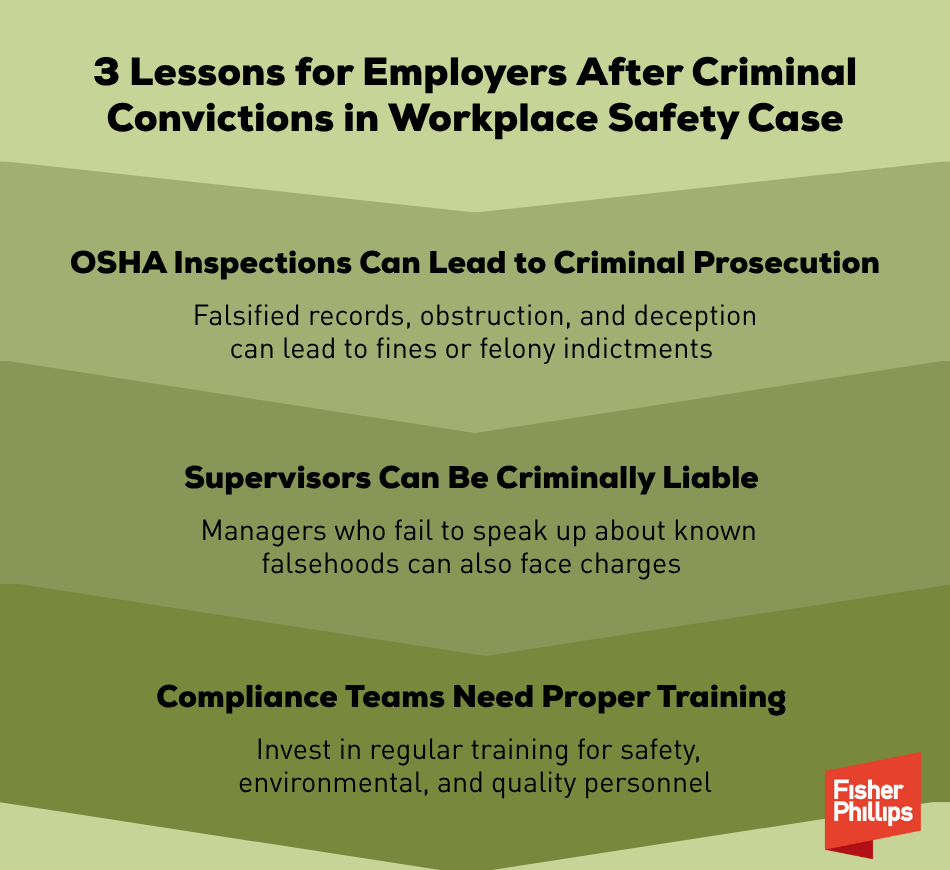A federal court of appeals just upheld the convictions of two workplace managers after an OSHA inspection quickly evolved into a criminal prosecution. The U.S. Court of Appeals for the 7th Circuit offered a stark warning to employers with the June 10 decision: misconduct during workplace safety inspections, especially those involving false records and statements, can lead to prison time and multi-million-dollar fines. What are the three main takeaways employers and corporate managers should take from this decision?
Workplace Tragedy Leads to Federal Prosecution
On May 31, 2017, an explosion at Didion’s corn milling facility in Cambria, Wisconsin, killed five workers and injured several others. In the aftermath, OSHA cited the company for more than 20 serious and willful violations and imposed $1.8 million in fines as part of a settlement agreement with the U.S. Department of Labor. However, the company’s problems were far from over.
After OSHA completed its investigation, the DOL referred the case to the U.S. Department of Justice. In May 2022, the DOJ indicted Didion Milling and six of its employees for conspiracy, false statements, and fraud. The charges allege a month’s long scheme to falsify safety and environmental records, mislead OSHA inspectors, and deceive customers.
Didion Milling ultimately pleaded guilty to falsifying records and was sentenced to five years of probation, ordered to pay $10.25 million in restitution to victims, and fined and additional $1 million. Several of its employees also pleaded guilty to criminal charges. Three employees went to trial – one was acquitted, and two others were convicted.
Derrick Clark’s Convictions Upheld for Falsified Records
The 7th Circuit first upheld the criminal convictions of Derrick Clark, Didion’s former Vice President of Operations, and affirmed his 24-month prison sentence. His crimes centered on his role in submitting false environmental compliance documents to government regulators.
- One of charges centered on Didion’s 2017 mid-year compliance submission to the Wisconsin Department of Natural Resources. Clark signed a report stating the company was in full compliance with its pollution permit. In truth, mill workers had been falsifying pollution control logs by recording values that appeared to fall within the acceptable range, regardless of the actual readings.
- At trial, prosecutors introduced emails showing that Clark had been warned about the company’s inaccurate recordkeeping and the importance of truthful reporting. The appellate court found this evidence sufficient to support the jury’s finding that Clark knowingly signed a false compliance report. It also rejected the argument that Clark could avoid criminal liability simply because he had not written the report himself. Under federal law, signing a compliance document one knows to be false is enough to sustain a conviction.
- Clark was also convicted of helping another employee submit false records to OSHA. The other employee, who pleaded guilty and was sentenced to 24 months in federal prison, told investigators that he and Clark had agreed to remove color coding from a separate set of logs ahead of a WDNR audit. The color coding would have highlighted discrepancies in the reported data. Clark then attended the audit, remained silent, and did not disclose the falsifications.
- The court emphasized that even if Clark did not submit the false documents himself, his role in the facilitating their use – and remaining silent during the audit meeting – was sufficient to support a conviction for aiding and abetting the making of false documents.
Shawn Mesner’s Wire and Mail Fraud Convictions Upheld
The court also affirmed the conviction of Shawn Mesner, Didion’s former food safety superintendent, for conspiracy to commit wire and mail fraud.
- Prosecutors alleged that Mesner participated in a broader scheme to conceal unsafe working conditions by falsifying pollution and sanitation logs and misleading auditors and regulators. According to the government, these falsified records led to favorable audit outcomes and allowed the company to maintain key relationships with major customers.
- Mesner challenged the sufficiency of the evidence on appeal, arguing that the false records were not “material” – meaning they were not important enough to influence customer decisions, a necessary element of a wire and mail fraud conviction. The court disagreed. It pointed to testimony from customer representatives who stated they would have stopped shipments had it known Didion falsified its cleaning logs and might have ended their business relationship altogether. And a third-party auditor added that the falsifications could have jeopardized Didion’s food certification – something many customers require.
- The court also cited emails showing Mesner instructing employees “to bring the [logbooks] up to date” ahead of a customer visit and a surprise visit from the Department of Agriculture. Taken together, the court concluded the evidence was more than sufficient to support the jury’s finding of material deception and upheld Messner’s conviction for conspiracy to commit wire and mail fraud.
3 Lessons Employers Must Learn from Didion’s Mistakes
This case offers a sobering reminder to companies about the legal consequences of regulatory noncompliance and poor recordkeeping. Here are three lessons you can learn from this cautionary tale.
1. OSHA Inspections Can Lead to Criminal Prosecution
- An OSHA inspection is not always the end of the road. If investigators uncover falsified records, obstruction, or deception, a referral to the DOJ or state equivalent could follow.
- Administrative penalties can quickly become felony indictments.
2. Supervisors Can Be Criminally Liable
- Managers and supervisors who sign compliance documents or direct employees involved in recordkeeping may face criminal liability, even if they did not falsify records themselves.
- Silence is not a shield. Failing to speak up about known falsehoods can support aiding and abetting charges.
3. Compliance Teams Need Proper Training
- Employers should invest in regular training for safety, environmental, and quality personnel to ensure they understand accurate reporting standards and how to handle audits.
- Periodic internal audits can help catch mistakes before they escalate into legal exposure.
Conclusion
If you have any questions about OSHA compliance and managing criminal exposure, contact the author of this Insight, your Fisher Phillips attorney, or any attorney on our Workplace Safety team. Make sure you are subscribed to Fisher Phillips’ Insight System to get the most up-to-date information. If you have any questions, contact the authors of this Insight, your Fisher Phillips attorney, or any member of our Workplace Safety Team.



